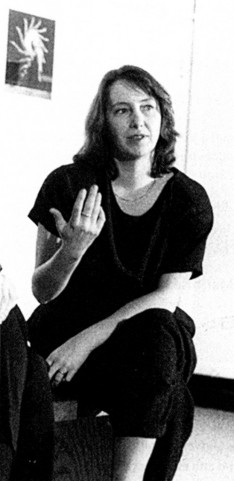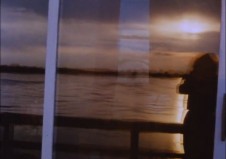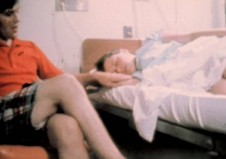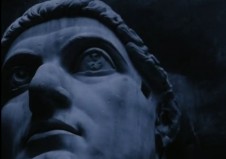Intimate Observer: Family Portrayals by Marjorie Keller

Marjorie Keller
Saturday, December 10, 2016, 7:00
Los Angeles Nomadic Division and Los Angeles Filmforum present
Intimate Observer: Family Portrayals by Marjorie Keller
At the Gamble House and Neighborhood Unitarian Church, Pasadena
Note the Change in Venue and Time!
4-7 pm cocktail reception at the Gamble House on the terrace with an open house from 4-6pm
7-8:30 pm screening at the Neighborhood Church Sanctuary
The Gamble House, 4 Westmoreland Place, Pasadena CA 91103
The Neighborhood Church, 301 Orange Grove Blvd, Pasadena, CA 91103
(They are next door to each other)
This screening is in conjunction with the Los Angeles Nomadic Division’s exhibition, On the Verge of an Image: Considering Marjorie Keller, at The Gamble House in Pasadena, on view from October 8 – December 11, 2016.
“In her brief life, Marjorie Keller made nearly thirty films in her own distinctive cinematic voice. From her earliest efforts in the late 1960s, Marjorie was attracted to film’s potential to portray the complexity of private events and personal relationships, mostly in response to family life. Her gestural and vivid camerawork, along with an intricate approach to poetic editing, created a body of work that is unsurpassed in its intimacy and its conveyance of subtle feelings and complex responses to her personal interactions.
Marjorie’s subjects included her old family house, young women friends, childhood fantasy figures, lovers, siblings, teenage girls, her parents, and her husband. Issues sprang naturally from sharing her life with the people and places she knew, and their range is astonishing: childbirth, sexuality, memory, the cultural roles women, political activism, the sensuality of daily objects, urban survival, rural pleasures and the values of classical tradition. While deeply influential on both feminist art and the culture of personal experimental filmmaking, Marjorie’s work exists beyond categorization or reductive explanation. It is alive with multiple, often-contradictory meanings and remains a personal experience.
More than half of Marjorie Keller’s films were made with Regular 8mm or Super-8mm equipment, and these ‘small-gauge’ home-movie mediums provided an immediacy and fragility that were perfectly suited to her interests. While Marjorie made more ambitious, 16mm poetic film-essays later (Daughters of Chaos, The Answering Furrow, Herein), she returned to the relative simplicity of 8mm throughout her career.
Tonight we will see several Regular-8mm or Super-8mm films by Marjorie Keller as they were originally intended, as 8mm or 16mm prints (blown-up from 8mm camera material). Several are exceedingly rare, but this special Gamble House show is an occasion in which all aspects of her filmmaking should be celebrated. In addition, a few of her 16mm films that extended her interest in intimate expression into 16mm film will also be shown.” -- Steve Anker, CalArts Film/Video Faculty, Co-Curator, Film at REDCAT
Admission is free. For more information: www.lafilmforum.org or 323-377-7238 or http://nomadicdivision.org/
Marjorie Keller (1950-1994) wrote: "The current art of the film deranges its predecessors." It is in the work of women filmmakers of the avant-garde that the old forms are seen as if through an anamorphic lens. Her films honor and challenge the traditions that she assumed when she learned filmmaking from Saul Levine, Sidney Peterson, and Stan Brakhage. Keller consistently explored the political implications of daily living and personal pleasures in her more than twenty films. – Canyon Cinema Catalogue
Marjorie Keller (1950-1994) made approximately twenty films and wrote The Untutored Eye: Childhood in the Films of Cocteau, Cornell, and Brakhage and The Moon on the Porch [a pop-up book]. She taught filmmaking at the University of Rhode Island and served as the President of the Filmmakers Cooperative of New York. Her films have rarely been screened in Los Angeles.

She/va
She/va
(1973, Regular 8mm, Color, Silent, 3 min.)
“A young dancer re-choreographed through film editing. This film was originally made in standard 8mm, from a home movie.” - Marjorie Keller
By 2's and 3's: Women
(1976, Regular 8mm, Color, Silent, 7 min.)
“This film puts together a perspective on the unhappy experience of traveling in cars - an activity aimless and unmemorable. The splicer makes a new trip of the footage, limited not to the represented geography but to the after-effect on the mind and heart of the first trip.” - Marjorie Keller

Part IV: Green Hill
Part IV: Green Hill
(1972, Regular 8mm on 16mm, color, Silent, 3 min.)
“Fleeting 8mm views of the Rhode Island coast reach beyond the home movie towards deeper mysteries of light and presence. With window-framed shots, intimate shadows and a few sly self-portraits, Marjorie Keller gestures towards a subjectivity of the light touch.” – Filmmakers’ Cooperative Catalogue

Misconception
Misconception
(1977, Super-8mm on 16mm, Color, Sound, 42 min.)
MISCONCEPTION print courtesy of the Reserve Film and Video Collection of The New York Public Library for the Performing Arts. MISCONCEPTION has been preserved with funding from the National Film Preservation Foundation.
"Misconception is a film structured on juxtapositions: indoors/outdoors; redecoration/destruction; exercises/actual birth; male opinion/female opinion; preparation/pain. Its montage structure of both image and sound balances Misconception on the precarious moment, like birth, between these counter-posed positions: conception/misconception, point/counterpoint." - Anne Friedberg
"Misconception is composed of six parts that together chronicle the experience of one woman and her husband during the course of her natural childbirth. The film communicates the precision and care with which it has been assembled. (The) structure lends the film a pacing rhythm that has less to do with traditional cinema-verité documentary or film journalism than with the pacing and rhythm of poetry." - B. Ruby Rich
Ancient Parts and Foreign Parts
(1979, 16mm, Color, Silent, 6 min.)
“The first two in a series of in-camera edited films. Ancient Parts portrays the symbolic differentiation and mock conquest of a boy and his mother.”
“... I watched the boy play Narcissus and Oedipus in three minutes. The small camera, the fact that we had all lived together for so long (during the shooting of Misconception), the rich golden grain of the film all provide the privilege of intimacy. Foreign Parts portrays the poetics of family life in an unfamiliar context. Foreign Parts is a single camera roll. Many people go home to foreign parts: a few familiar faces in a strange landscape. In such circumstances the ordinary is the most precious, given a slight shift of being in its new context. All we can glean from the experiences are a few new memories built on old images. Using a camera at such times is refined work; raw intuition works better than careful planning.” – Marjorie Keller

The Fallen World
The Fallen World
(1983, 16mm, Color/B&W, Sound, 9 min.)
“An elegy for a Newfoundland dog named Melville and a portrait of his owner.” – Marjorie Keller
